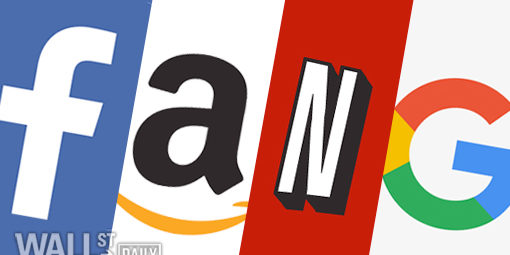The FANG stocks (Facebook, Amazon, Netflix and Google) have had an incredible run since Jim Cramer and I first talked about them in 2013. Their meteoric rise is legendary, mostly because they paved the way for new trends in technology. They also spawned an ETF named FANG Plus and a futures contract.
This leads us to ask: could a six year bull run for these names be ending?
Off the Charts from CNBC.
If you listened to the chatter, you’d think the answer was yes. While many investors look for the next FANG stocks, the current names are often neglected or ridiculed. We’ve all heard people say that Netflix is done or that Google will fall to regulation. Yet every year, investors and traders bid up these stocks like they are going out of style.
The “doom and gloom” scenarios are not without merit. Stocks tend to reach levels of maturity. The “old” four horsemen – Microsoft, Intel, Cisco Systems and Oracle – were put out to pasture when the dot.com bubble burst nearly 20 years ago. Microsoft reinvented itself for the 21st century, but Oracle has been lapped by the competition.
FANG stocks will need to make adjustments or they will become old, stodgy companies.
The FANG stocks are still pretty sharp
However, if 2019 is any indication, these stocks are not going anywhere. All four are higher for the year, with Facebook leading the way (up 41%). Even with regulatory issues hanging over it, this stock continues to report great metrics each quarter.
Google is next (up 25%). This company remains the king of innovation and is growing the top/bottom line better than ever.
Amazon is up only 12% for 2019, but it was much higher prior to the last earnings report. It’s still investing and growing its footprint.
Finally there is Netflix, by far the biggest winner of the group since 2013. It has faltered in 2019 amid strong competition and pricing concerns. It is near flat for the year but was up 25% at one time. It will need to re-charge its batteries in a fiercely competitive streaming space.
So, there you have it. The FANG stocks are still relevant and looking for higher prices in 2020. It may not be like the days of old, but these solid companies should weather any storm the markets may encounter.




















